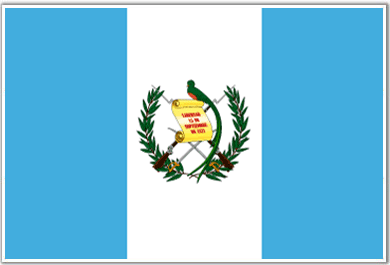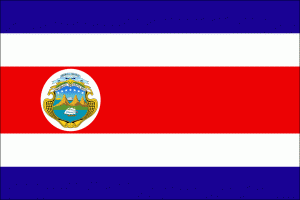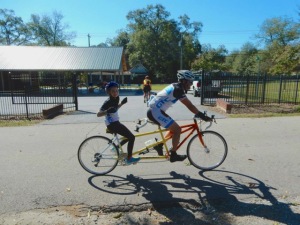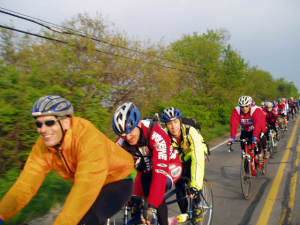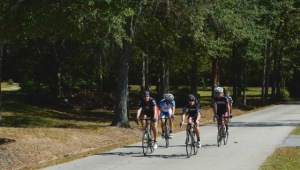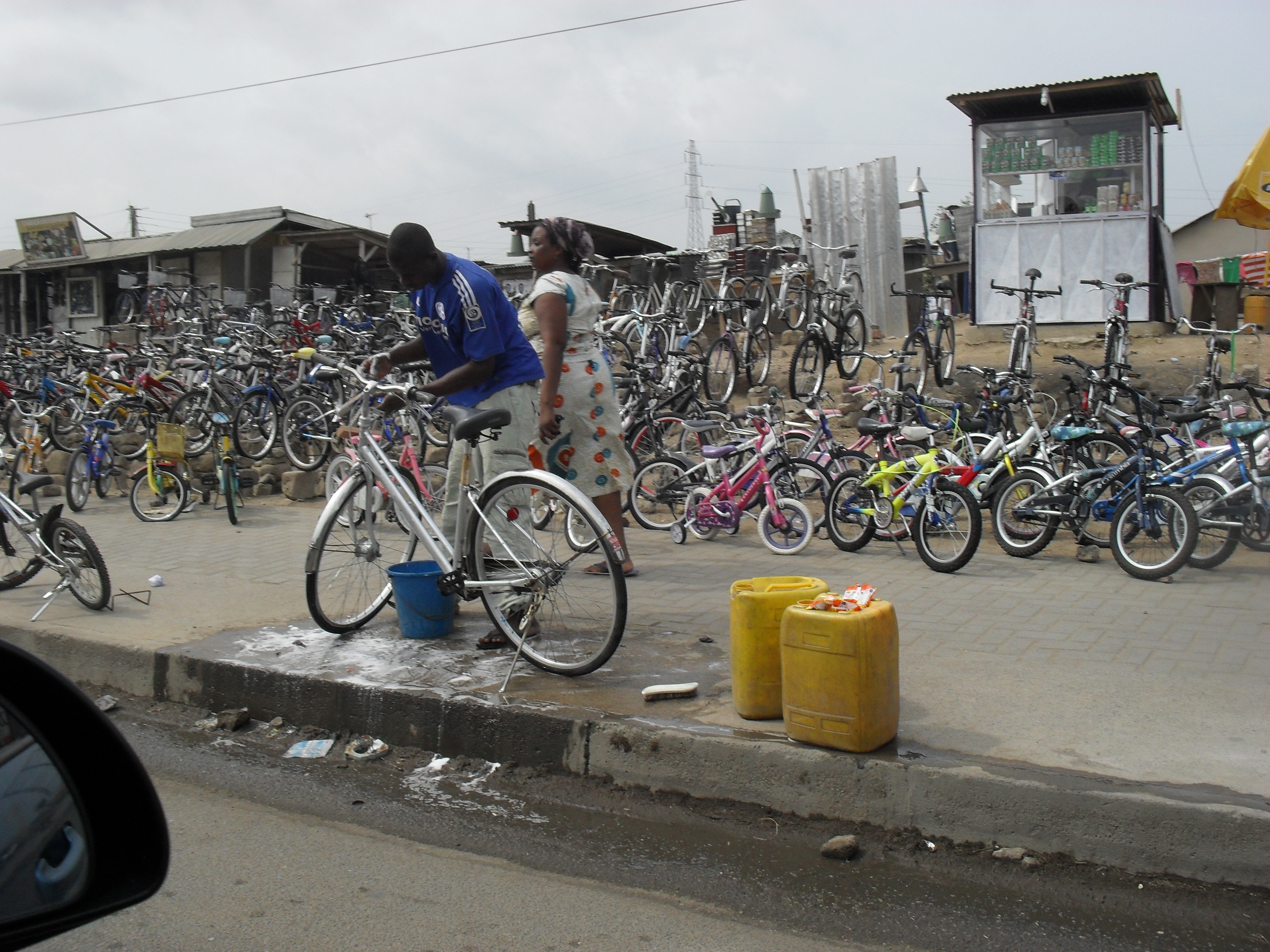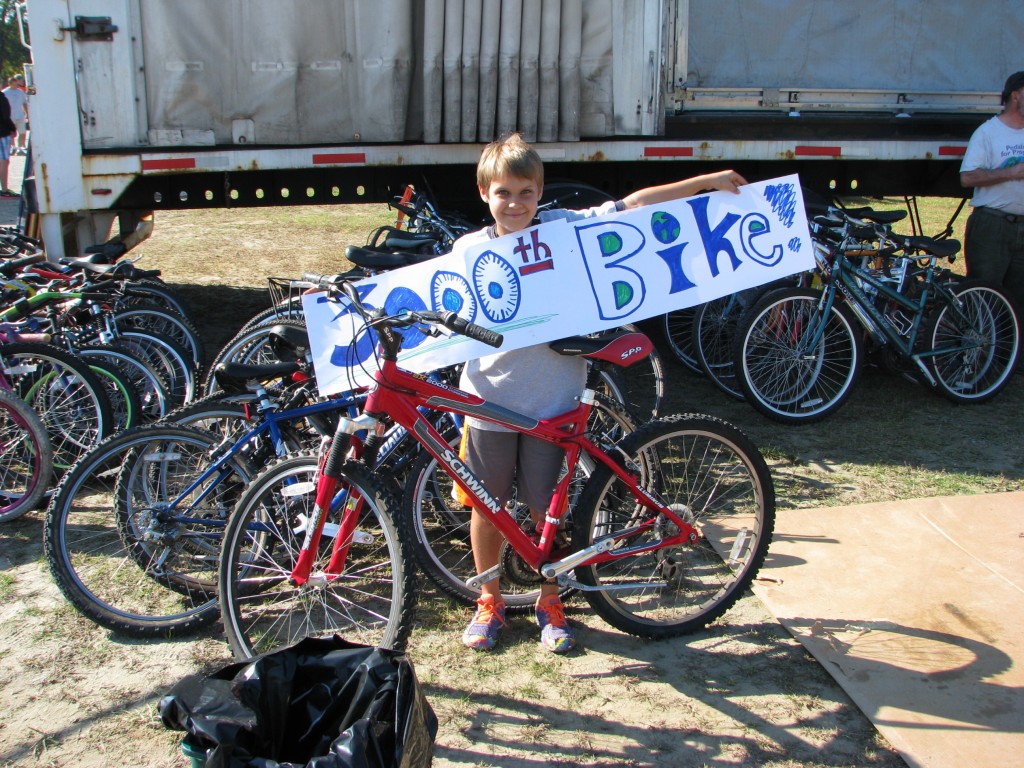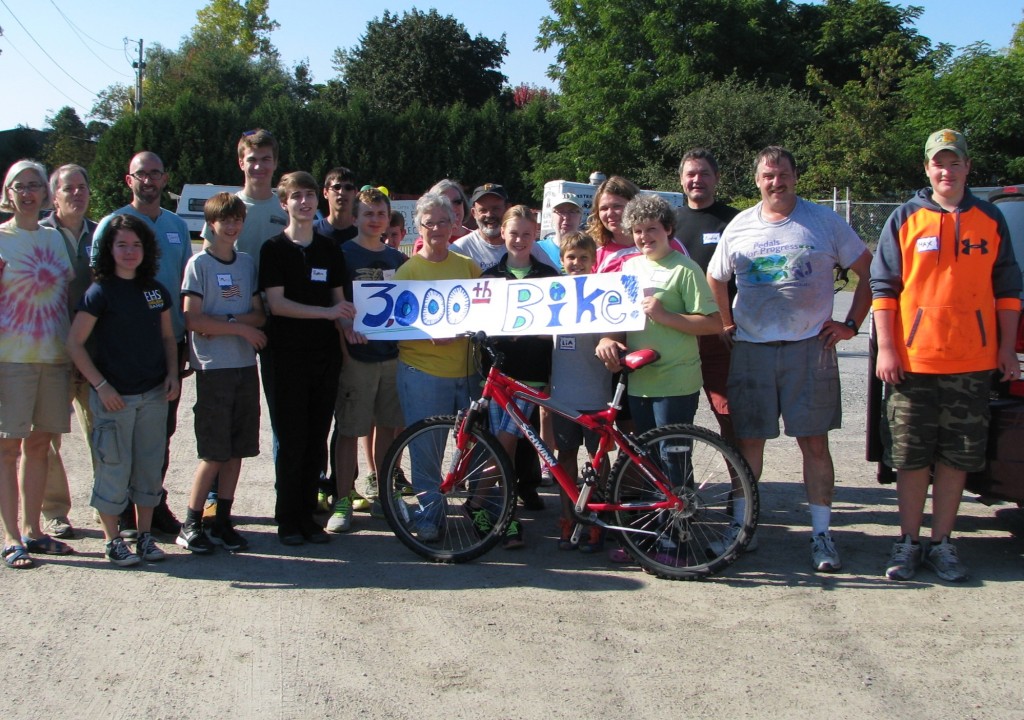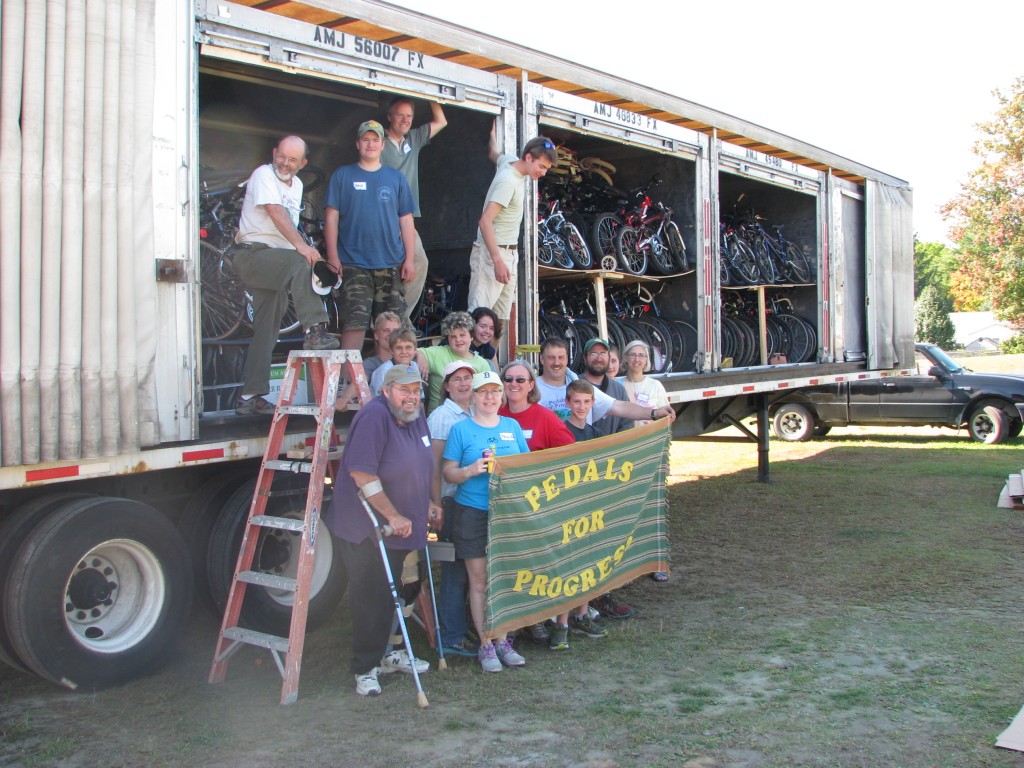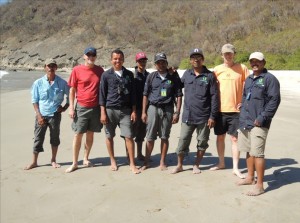Category Archives: bicycles
Costa Rica
The Borough of High Bridge Green Award, 1/22/15
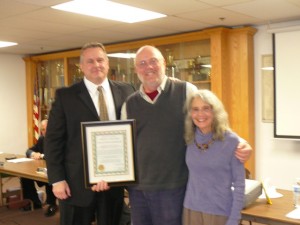 David Schweidenback is hereby the recipient of the High Bridge Environmental Commission’s eighth annual Borough of High Bridge Green Award for 2014 in recognition of his continuing dedication to promoting environmental preservation.
David Schweidenback is hereby the recipient of the High Bridge Environmental Commission’s eighth annual Borough of High Bridge Green Award for 2014 in recognition of his continuing dedication to promoting environmental preservation.
David Schweidenback was “Caught Being Green” by fellow residents who nominated him for this award for his ongoing environmental actions. David’s Pedals for Progress organization founded in 1991 rescues bicycles destined for overburdened US landfills and ships them to developing countries where they are sorely needed and highly valued. P4P Bikes are put to work not only is basic transportation, but are used as a supplement to school and community programs.
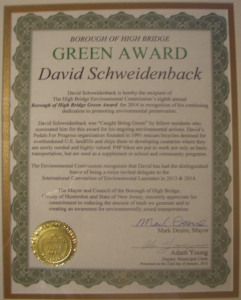
The Environmental Commission recognizes that David has had the distinguished honor of being twice invited delegate to the International Convention of Environmental Laureates in 2012 and 2013.
The Mayor and Council of the Borough of High Bridge, County of Hunterdon and and the State of New Jersey sincerely appreciate his commitment to reducing the amount of trash we generate and creating an awareness for environmentally sound transportation.
Mark Desire, Mayor
Happy 2015 from FIDESMA – Guatemala
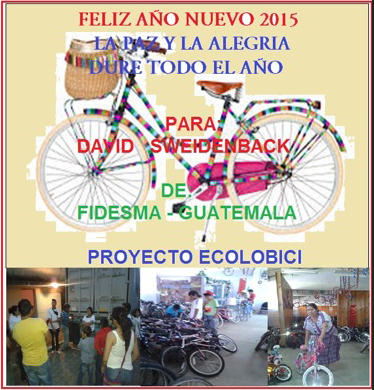 Hola David, Muchos Saludos, Esperamos se encuentre bién, con bendición en su casa. Agradecemos a Usted y su asociación, todo el apoyo que nos da, es un proyecto que beneficia a muchos hogares y familias, hace más feliz la vida de muchos niños, jovenes y personas que jamás pensaban que podían tener una bicicleta para su ayuda personal y laboral. Adjuntamos una sencilla tarjeta, de todo corazon, deseamos que lo usted esté haciendo sea de bendición para todos los que le rodean.
Hola David, Muchos Saludos, Esperamos se encuentre bién, con bendición en su casa. Agradecemos a Usted y su asociación, todo el apoyo que nos da, es un proyecto que beneficia a muchos hogares y familias, hace más feliz la vida de muchos niños, jovenes y personas que jamás pensaban que podían tener una bicicleta para su ayuda personal y laboral. Adjuntamos una sencilla tarjeta, de todo corazon, deseamos que lo usted esté haciendo sea de bendición para todos los que le rodean.
Hasta pronto,
Margarita Caté y compañeros
FIDESMA Guatemala
Dear David, Greetings from FIDESMA. We hope that this letter finds you well and that all is well with your family. We would like to thank you and your organization for all of the support that you give us, for all of the families that have benefitted from P4P and the children and young people that have improved their situation in life with a bicycle. We have created this simple card with all of our hearts and sincerely feel that all of your work is a blessing to everyone that comes in contact with Pedals for Progress.
Until we speak again,
Maragarita Caté and Associates
FIDESMA Guatemela
In Honor of Sean Tyrrell
By Fran Tyrrell
“On October 18th, 2014, a memorial bike ride in honor of my husband, Shawn Tyrrell, was held in Gwinnet County, Georgia, by members of his bike club, the Gwinnett Touring Club (GTC). Shawn was an active member of the club, and toured with them both in Georgia and in Europe. Shawn passed away from a heart attack in 2013. Members of his club wanted to honor him by holding a group ride, and I was asked to pick a charity. I had heard of Pedals for Progress from my sister, who lives in West Orange, New Jersey, and the great work that this organization provides. Since Pedals for Progress is a group that combines our love of cycling with a global commitment to sustainable programs in developing countries, it was the perfect charity to choose. We had a beautiful day for the ride, and were provided with support along the route by club members, and even a police escort! We look forward to holding this event annually in the future.”
For the Love of Bicycles
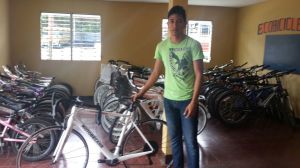 Even from the earliest days 25 years ago, not too long after we began to deliver bicycles, some young person who wants to race is hanging about, often willing to work for free just to be around bicycles. At first I really discouraged racing clubs because our real goal was income generation, workers getting to work. The love of bicycles and the love of racing have always won out. The people who work in the bike shop and the people who hang around there are always great bicycle enthusiasts.
Even from the earliest days 25 years ago, not too long after we began to deliver bicycles, some young person who wants to race is hanging about, often willing to work for free just to be around bicycles. At first I really discouraged racing clubs because our real goal was income generation, workers getting to work. The love of bicycles and the love of racing have always won out. The people who work in the bike shop and the people who hang around there are always great bicycle enthusiasts.
Juan Carlos Jimenez is such a young man. 18 years old, he works in a bicycle parts shop in Rivas, Nicaragua. In his spare time he is preparing for upcoming competitions racing up and down the steep jagged foothills of western Nicaragua. Thanks to the donation of this beautiful carbon-fiber Motobecane bicycle to Pedals for Progress, Juan Carlos has an exceptionally good bike to race.
I have often been asked, Is this bike too good? No bicycle is too good. There is a purpose for every bicycle. We seek to ship the highest quality bikes possible and when we can obtain such a beautiful racing bike, there is a great demand for that bicycle overseas.
Ghana Photos – 2013
Green Mountain RPCVs Collect 3,000th Bicycle
The Green Mountain Returned Peace Corps Volunteers held their 16th annual used bike and sewing machine collection for Pedals for Progress on Saturday, September 27, 2014, in Essex Junction, Vermont. During the 4 hour event, community members donated 169 bikes and 29 sewing machines.
A highlight of the day was the donation of the 3,000th bike the group has collected – a bright red Schwinn. The surprised donor was greeted by a cheering group of volunteers, and was presented with a Pedals for Progress ceramic mug.
Since their first collection in 1999, the group has shipped 3,143 bikes and 78 sewing machines to Pedals for Progress from northern Vermont. FedEx has donated the shipping of all of these bikes from Vermont to New Jersey and for the past few years they’ve had exuberant help on collection day from teenage members of Ripple, a local ecumenical youth group.
High Bridge man makes a difference with bicycles
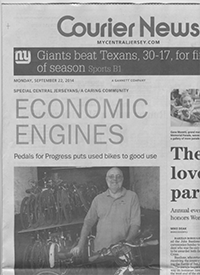 High Bridge man makes a difference with bicycles
High Bridge man makes a difference with bicycles
Pedals for Progress provides bicycles and sewing machines to developing countries to put people to work.
Check out this story on mycentraljersey.com: http://mycj.co/1utyV5z
Paso Pacifico Turtle Rangers
by Michael Sabrio
Fall 2014 InGear
The Spring 2014 InGear newsletter introduced the turtle rangers of Paso Pacifico. The rangers patrol beaches in southwestern Nicaragua to try to protect the turtles that nest there. Through a happy collaboration of Paso Pacifico, the Turtle Conservancy, and Pedals for Progress, the rangers now use P4P bikes for commuting and patroling.
In February Gary Michel and I visited the Paso Pacifico rangers and got a first-hand look at what they do. The Paso Pacifico staff in California and Nicaragua were extremely helpful in arranging the logistics. (Thank you, Kate Dolkas!) Paso Pacifico driver Don Meyer Roderíguez picked Gary and me up in Rivas for the 35-mile ride to Ostional Beach, where we would meet the rangers. Claudia Perla, a Paso Pacifico forest ecologist, came along for part of the ride.
Besides their work with turtles, Paso Pacifico has projects on monkeys, reforestation, and “felinos grandes” (big cats) among others. (In 2010, a Paso Pacifico camera trap got photos of a couple of jaguars in areas where jaguars were thought to have been extinct for many years.)
About half our ride was on excellent paved roadway. We passed through the beautiful Pacific Ocean resort town of San Juan del Sur, then headed south on rough unpaved roads. We were there in the dry season, so we had only the bumps, ruts, potholes, and dust to deal with. We wondered how much worse it is in the rainy season and how far the rangers had to travel to get to their patrols. Claudia rode with us to a site near Ostional where she planned to spend a few days with a local family setting up a monitoring program to help determine food resources for spider monkeys. We said goodbye to Claudia and continued down the road to Ostional.
Coco Beach
We stopped at Coco Beach, where Paso Pacifico has one of its turtle hatcheries. A hatchery is a rectangle in the sand near the beach with wire fencing and a covered top to provide shade. Inside, individual plots of a few square feet are marked with the date the eggs were found and estimated date of hatching. Here at Coco Beach, there were no turtle eggs. A sign said that there was lodging and a restaurant here; if you want a vacation truly off the beaten path, this is the place for you.
Refugio del Flor
Our next stop was at Refugio del Flor, a national reserve famous for massive influx of Olive Ridley turtles. Nicaraguan soldiers were posted here when we visited. A board that shows counts of nesting turtles by month and by year has some big numbers – between 23,000 and 30,000 turtles from September through November of last year – but any relief you feel is tempered by very high mortality rates for newborn turtles – at least 90%.
Ostional
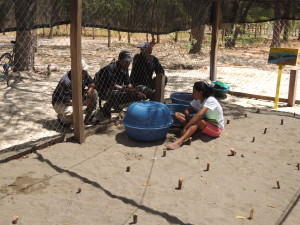 Our final destination was the beach at Ostional. Salvador Sánchez, the Paso Pacifico turtle coordinator (how’s that for a job title), lives right here with his family in a spectacular isolated spot on the beach. We met the rangers on duty that day: Daniel, Eliezer, Erick, Felix, Jairo, Jorlin, Marcos, and Salvador. They had their trusty P4P bikes. Gary and I mounted a couple more P4P bikes that Meyer had picked up from our long-time contacts in Rivas, the Santana family. We left these two extra bikes for the rangers at the end of our ride. Salvador, some of the other rangers, Gary, and I rode our bikes a few hundred yards south to another of the Paso Pacifico turtle hatcheries. Paydirt!
Our final destination was the beach at Ostional. Salvador Sánchez, the Paso Pacifico turtle coordinator (how’s that for a job title), lives right here with his family in a spectacular isolated spot on the beach. We met the rangers on duty that day: Daniel, Eliezer, Erick, Felix, Jairo, Jorlin, Marcos, and Salvador. They had their trusty P4P bikes. Gary and I mounted a couple more P4P bikes that Meyer had picked up from our long-time contacts in Rivas, the Santana family. We left these two extra bikes for the rangers at the end of our ride. Salvador, some of the other rangers, Gary, and I rode our bikes a few hundred yards south to another of the Paso Pacifico turtle hatcheries. Paydirt!
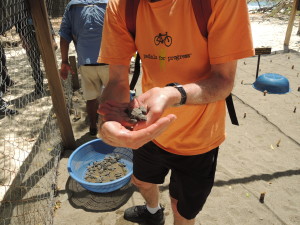 A batch of a few dozen turtles had just hatched that day. A Paso Pacifico employee was tending them, keeping them safe and healthy. They were to be released that night into the Ocean, which was a few dozen yards from the hatchery. Because of predation by gulls and other shoreline animals, the first few minutes of a turtle’s life – from the time they emerge from the nest, crawl across the beach, and plunge into the ocean – are hugely dangerous. The Paso Pacifico program saves the turtles from at least this threat.
A batch of a few dozen turtles had just hatched that day. A Paso Pacifico employee was tending them, keeping them safe and healthy. They were to be released that night into the Ocean, which was a few dozen yards from the hatchery. Because of predation by gulls and other shoreline animals, the first few minutes of a turtle’s life – from the time they emerge from the nest, crawl across the beach, and plunge into the ocean – are hugely dangerous. The Paso Pacifico program saves the turtles from at least this threat.
We rode our bikes back to the beach at Ostional and took a boat ride to a nearby beach that is a popular turtle nesting site. One of the rangers dug up a nest where the turtles had recently hatched and counted several dozen eggshells plus 4 marble-sized eggs that had not developed. We hoped that the turtles hatched here had made it safely to the Ocean. Because the turtles come ashore at night, the rangers’ schedule must accommodate them. A couple of the guys on our ride were getting ready to start their 6pm to 6am shift. They explained that their jobs are sometimes routine and sometimes dangerous. Sometimes there is nothing to report. Rangers have no official authority to confront or stop poachers, who may be armed. The rangers rely mostly on their ties to and respect from the community. It also helps that Paso Pacifico pays compensation to local people who help with its conservation programs. People who find a turtle nest get money when they bring the eggs to a Paso Pacifico hatchery. Families who lose livestock to predation by the big cats and even people who can show evidence of the cats (such as cell-phone photos) are also paid.
Besides being incredibly interesting and beautiful, our trip gave us a better appreciation of how much a bicycle can help people do their jobs where transportation is unreliable and expensive. We also have a better appreciation of how hard it is to balance the preservation of ecosystems and rare animals with the day-to-day survival of very poor people.

